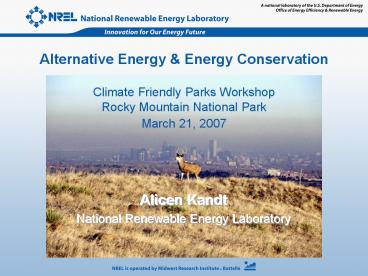Alternative Energy - PowerPoint PPT Presentation
1 / 10
Title:
Alternative Energy
Description:
Alternative Energy & Energy Conservation. Climate Friendly Parks Workshop ... Fewer (or no) emissions or greenhouse gases associated with energy production ... – PowerPoint PPT presentation
Number of Views:32
Avg rating:3.0/5.0
Title: Alternative Energy
1
Alternative Energy Energy ConservationClimate
Friendly Parks WorkshopRocky Mountain National
ParkMarch 21, 2007
- Alicen Kandt
- National Renewable Energy Laboratory
2
Realize the Benefits
- Reliable, distributed power supplies and fuel
diversification, which enhance energy security - Fewer (or no) emissions or greenhouse gases
associated with energy production - Greater energy price stability
- Lower utility bills
- More power for peak-use
- Lower risk of fuel spills in environmentally-sensi
tive, remote locations - Less need for imported fuels
- Reduced OM costs
3
Conserve Energy
- Efficiency First!
- EPAct 2005 E.O.13423
- Reduce utility-billed energy consumption
- Increase use of renewable energy
- Apply High Performance Sustainable Buildings
MOU Guidelines
- Lighting
- Implement Lighting Retrofit Workbook A Practical
How To Guide for National Park Service Visitor
Centers - OM
- Utilize Best Practices (several DOE/FEMP guides)
- Employ commissioning metering when possible
4
Tap into Renewable Energy Sources
- Electricity
- Solar Photovoltaics (PV)
- Wind
- Micro-hydro
- Thermal
- Daylighting and Passive Solar
- Solar water heating
- Solar ventilation preheat
- Geothermal heat pump or GeoExchange
- Biomass
- Conversion produce electricity and heat
- Combustion or Gasification
- Biofuels ethanol, methane, bio-oil, and
biodiesel - Green Power Purchase
5
When to Consider Solar PV
- Small or Stand Alone Loads
- Emergency call boxes or security gates
- Parking lot lights or sign lighting
- Communications/monitoring equipment
- Comfort station lights and ventilation
- Fee collection stations
- Avoided Line Extensions
- 20k/mile or more
- New loads beyond electrical distribution system
- Water pumping
- Remote Diesel Generators
- Producing power at 0.20/kWh or more
- Buildings Integrated PV
- Peak shaving and UPS or emergency power
- PV replaces part of building skin costs
6
When to Consider Geothermal
- New construction or existing facility with
hydronic piping - Major renovation when existing systems obsolete
- High water table or relatively moist, damp soil
- Ground-level parking area or open land for loop
installation, or access to ground or other water - Mixture of heating and cooling needs
- Multiple zones, both core and perimeter
- Water heating, snow melt, and process applications
7
When to Consider Biodiesel
- Diesel vehicles and engines
- B20 is most common use, 20 bio and 80 petroleum
diesel blend - B100 has cold start and storage shelf life
limitations - Purchase B20 through DESC at prices similar to
diesel - Hundreds of engines already use biodiesel in 20
Parks - Yellowstone, Grand Teton, Glacier
- Pictured Rocks
- B20 blended into diesel fuel tanks
- Soy-based lubricants, hydraulic fluid, 2-cycle
oil, crankcase oil
8
Purchase Green Power
- Three methods
- Regulated Utility Green Pricing Programs
- Xcel Energy WindSource program
- Competitive Renewable Power
- Currently does not apply in Colorado
- Renewable Energy Certificates (RECs)
- A.k.a. tradeable renewable certificates,
renewable energy credits, green energy
certificates, or green tags - Represent environmental attributes of renewable
generation and can be sold separately from the
electricity - GSA, DESC, and WAPA can assist with purchases
- Wind energy is the most common form
- Good option when on-site renewable energy is not
possible or cost effective
9
Get Started
- What renewable resources are available in my
area? - What applications are best for my facility?
- What are the objectives of my renewable energy
project? - How big (or small) should my project be?
- What are the costs and benefits of my project?
- How much funding do I need?
- What kind of assistance can FEMP, State Energy
Office, NREL or others provide?
10
In closing































